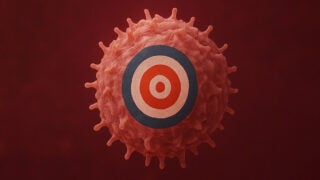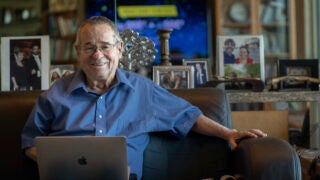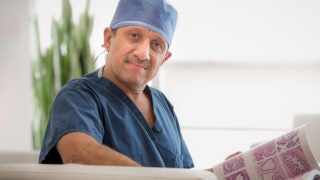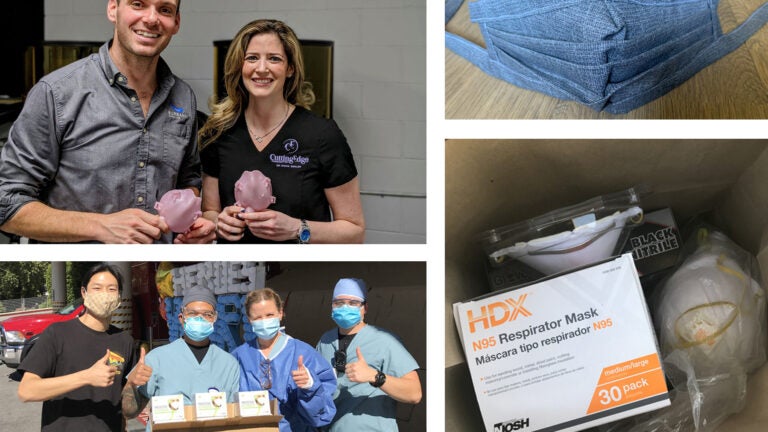
Creating masks, making hand sanitizer, raising money and engineering new technologies are some ways USC alumni are helping others during the pandemic. (Photos/Courtesy of Andrew and Diana Sedler, Amy Atmore and Thomas Won, clockwise from top left)
USC alumni join push to protect doctors, nurses and other health care heroes from COVID-19
Trojans across the world are stepping up in this time of need with 3D printing expertise, generous donations and countless acts of kindness in response to the coronavirus outbreak.
Business dwindled at Burbank Dental Lab during the onset of the coronavirus pandemic, and the lab’s eight 3D printers grew silent. They made no custom implants for dental patients. They crafted no crowns to protect vulnerable teeth.
Then the lab’s owners — the Sedler family, including USC dentistry alumna Diana Sedler — had an idea.
Hospitals nationwide needed scarce protective equipment to keep staff members like doctors, nurses and respiratory therapists safe from COVID-19, the Sedlers learned. So, working with Lawrence Fung, another alumnus of the Herman Ostrow School of Dentistry of USC, they quickly rededicated their 3D printers to producing custom face masks. They’re using Fung’s open-source file and expertise from George Jaber, an adjunct assistant professor of clinical dentistry at the Ostrow School.
They can make up to 36 respirator masks a day and have already produced nearly 200 for hospitals across Los Angeles and medical workers on the East Coast. The dental lab has used its own resources, including more than $60,000 in 3D printing material alone, and now accepts donations to keep the effort alive. As Diana Sedler explains, the reward lies in putting a “smile on people’s faces.”
Their work is only one of countless examples of how USC alumni have responded to the COVID-19 emergency with support for those on the front lines of health care.
“Through good times and in times of steep challenge, the Trojan Family answers the call,” said Corii D. Berg, president of the USC Alumni Association Board of Governors. “None of us has seen a situation quite like COVID-19 in our lifetime, and it gives me immense pride to see how our alumni have stepped up with their selfless acts and sacrifices so that they can help others in need. Though it’s remarkable, I am not surprised at all — that is just who our alumni are, and we are so fortunate to have these very real heroes among us.”
Read on to see how the Trojan Family, in ways big and small, strives to make a difference during this global crisis.
Donations from USC business alumni help keep medical professionals safe
Because of the highly contagious nature of COVID-19, protective gear for care providers is in short supply and often needs to be changed or discarded. Along with face masks and gloves, that means medical scrubs are in high demand.
Enter Mike Singer and his company, Careismatic Brands.
The Southern California-based business is the world’s largest supplier of scrubs, the clothing worn by medical workers. A recent delivery, however, came free of charge: The company donated $1 million worth of scrubs to hospitals across the nation.
“It is extremely important that we do everything possible to support health care professionals, especially right now in this time of crisis,” said Singer, an alumnus of the USC Marshall School of Business and the company’s CEO. “They are putting their own lives at risk to save lives. It’s a small gesture by comparison.”
Another USC alum-led business, Merle Norman Cosmetics, halted its typical production of skincare and makeup items to create hand sanitizer. Overseen by Jack Nethercutt, who earned his degree from USC Marshall, and his wife, Helen, the company shifted its focus at the urging of their son, Travis.
Now workers produce 55-gallon drums of the germ-fighting liquid. Medical professionals in Las Vegas and Carson City, Nev., recently received two drums, with more on the way to other doctors, nurses and care providers. The company bottles it, too.
“We’re going to fill every bottle and drum we have on hand,” Helen Nethercutt said. “We’ve ordered more drums and more alcohol, and we’re planning on running this all the way through June or July. We’re not going to just make a few batches and stop. We’re going to try and continuously make it as long as we have the need.”
Stepping up in a time of crisis is something of a family tradition. During World War II, Jack Nethercutt’s great-aunt Merle Nethercutt Norman, founder of Merle Norman Cosmetics, halted makeup production to instead create gun oil and camouflage paint sticks for the U.S. military.
Medical tech invented by USC alumni could reduce COVID-19 danger
Health professionals who care for COVID-19 patients know they risk exposure to the new coronavirus. But two graduates from the USC Viterbi School of Engineering hope to limit that risk with their patented remote health-monitoring technology.
Michael Maylahn and Dinesh Seemakurty, both biomedical engineering alums, created a cloud-based system that lets health workers check on their patients’ vital signs remotely. It can help preserve much-needed protective equipment while ensuring nurses and doctors can monitor temperature, blood pressure, respiratory rates and other critical markers of health.
“We hope to save lives and help the front-line care workers with this technology,” Maylahn said.
Through the duo’s company, Stasis Labs, the remote monitoring technology is now available at a discount to hospitals and other health care facilities facing an influx of COVID-19 patients. Their efforts are among many examples of USC Viterbi instructors, students and alumni using their technical expertise to protect health care workers during the pandemic.
To provide protective face masks, USC alum seeks to ramp up production
Scientists believe the primary way COVID-19 spreads is through respiratory droplets — the tiny particles produced when an infected person coughs or sneezes. That’s why masks and face shields are crucial tools in the fight against the virus.
With hospitals worldwide seeking masks and other protective gear, USC alum Brian Weitman sees a solution in Southern California’s apparel industry.
The USC Marshall graduate owns a Los Angeles-based company called STC-QST. It manufactures components used to make clothing, like pocket fabrics, waistbands and linings. He knows he could ramp up production of health apparel like masks, surgical gowns and booties.
So could others in the area, he said: Southern California holds 60% of the nation’s sewing capacity. But before they mobilize that workforce, the owners and operators of small factories must ensure they’ll stay in business.
Large upfront costs to produce masks and personal protective gear discourage many owners. They’d have to sterilize equipment and reconfigure sewing floors so machines are 6 feet apart to meet social distancing measures. Without some financial backup, most small factories can’t take the risk, he said.
As he tries to rally government and private sector support, he produces small batches of masks, paid for out of his own pocket, and donates them to health and social services workers in Los Angeles. And despite challenges, Weitman believes an answer is near.
“What I love about Los Angeles is that there are a lot of scrappy entrepreneurs here,” he said. “They’re going to figure out what needs to happen and get it done.”
Every effort counts: USC physical therapist graduate puts sewing skills to use
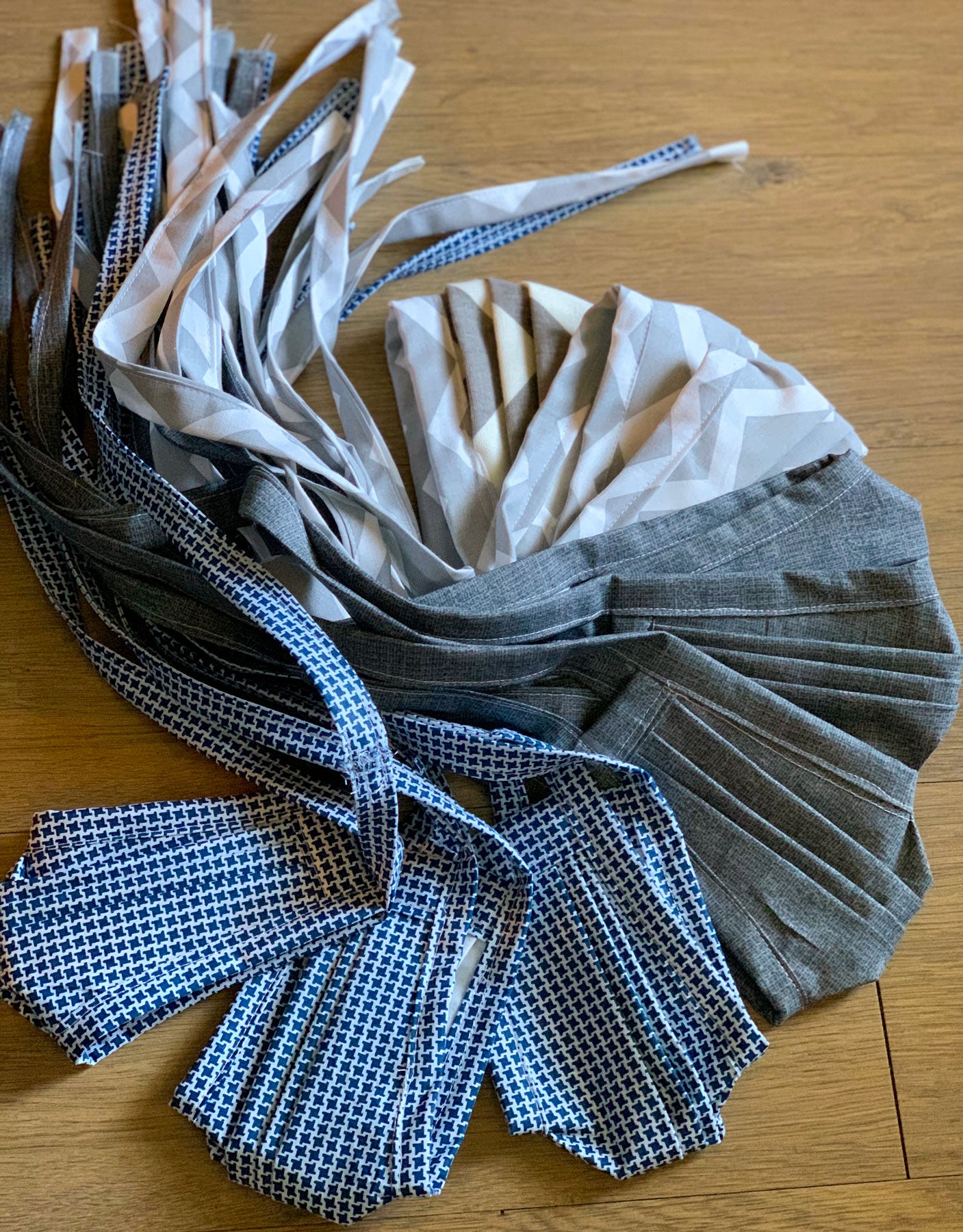
While sheltering at home and only able to work part time in her job as a performance therapist for the Phoenix Suns professional basketball team, Amy Atmore found she had lots of extra time on her hands.
The alumna of the USC Division of Biokinesiology and Physical Therapy also knew that health workers and others providing vital services during the pandemic urgently need protective masks.
“After finding out that my sister, who works in the ER, had to wear her mask for 20-plus hours — and that this was the new norm across many hospitals right now — I began thinking I could figure out a way to make a mask that could be washed and reused,” Atmore said.
She turned to a childhood hobby, sewing, to do her part. She has already produced several dozen masks for her sister, nurses, medical workers, police officers and firefighters. Although Atmore said the masks are intended as a last resort after professional gear runs out, they have given her a sense of purpose in a time of stress and uncertainty.
“This experience has reminded me that one person can make a difference,” she said. “You really can be the change you wish to see in this world, and by taking immediate action, you could help spark action in others.”
USC alums track down supplies for hospitals
A few months ago, most people likely didn’t know what PPE meant. Now the acronym for personal protective equipment is a household term.
With everyone searching for face masks, face shields, gloves and gowns, hospitals and other health care facilities struggle to keep their supply chains open. Several USC alumni have stepped in to fill the COVID-19 gap.
Thomas Won and Jessica Park are among them. They are recent graduates of USC — Won earned a degree in health promotion and disease prevention studies at the Keck School of Medicine of USC in 2019, and Park completed her business administration degree at USC Marshall in 2017. They source PPE for hospitals throughout Los Angeles through a community group called GetUsPPE LA.
The outfit has already raised more than $10,000 to purchase supplies and collected thousands of PPE items to donate to local medical workers. Won, Park and their colleagues continue to seek items like N95 respirator masks, hand sanitizer, face shields and disinfecting wipes.
“During this difficult time, it’s been incredible to see individuals from our community carrying the same burden and coming together to fill in the gap,” Park said.
Another USC grad in the PPE sourcing race is Ted Kaiser, a USC Marshall alumnus. Normally he’d be running his global recycling business, Dock7 Materials Group, but as the coronavirus pandemic spread, he shifted his attention. Now he sources FDA-approved masks, hand sanitizer and other medical equipment for wholesale buyers. Those seeking more information can send him an email.
Kaiser sums up the feeling among many USC alumni with a message on his business’s website: “A heartfelt thank you to all the medical community in the USA!”
USC’s John Hobbs, Aubrey Kragen and Julie Tilsner contributed to this story.

